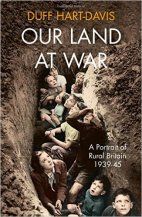Our Land at War: A Portrait of Rural Britain 1939-45 - Duff Hart-Davis

Our Land at War: A Portrait of Rural Britain 1939-45 -Duff Hart-Davis
Non-Fiction
Pages: 464
The Second World War irrevocably changed life in Britain in a multitude of ways, but none more so perhaps than the way it changed the very face of the countryside. Urban renewal is an inevitability across the centuries - buildings are torn down, re-built, refurbished, extended, torn down again - but the face of the British countryside had never been so drastically altered since the days of Enclosure. Parkland was put to plough, grassland dug up and devoted to new crops, vast swathes of forest cut down to meet the demand for timber, moorland turned over for firing ranges, airfields and bases beyond counting constructed across the South and Southeast of the country, new roads, new buildings, new camps, new runways. Little wonder that some returning soldiers scarcely recognised their homes at the end of the war.
Most histories of the Second World War focus on the glamour and drama of the war - the military histories, of course, and histories of the Blitz or life on the home front - but there was little glamour or drama in the countryside, and this is what Duff Hart-Davis focuses on in this book, drawing on oral accounts, letters, diaries and memoirs of those young and old at the time. From country sports to village fetes, evacuees and Land Girls, prisoners of war, foraging and the black market, new farming techniques and traditional country crafts, whole villages evicted to make way for military training, country houses requisitioned for soldiers and HQs, all of country life is here, and it's a marvellous read.
I found this quite a moving read in many places - and funny too, from the turning of badger setts into bunkers and the declaration of grey squirrels as public enemies. There are bombs here too, of course, and heroism, perhaps of a quieter sort, but to tell the story of the War by only focusing on the soldiers or the Blitz is to miss out the heroism of the rural backbone of the country.